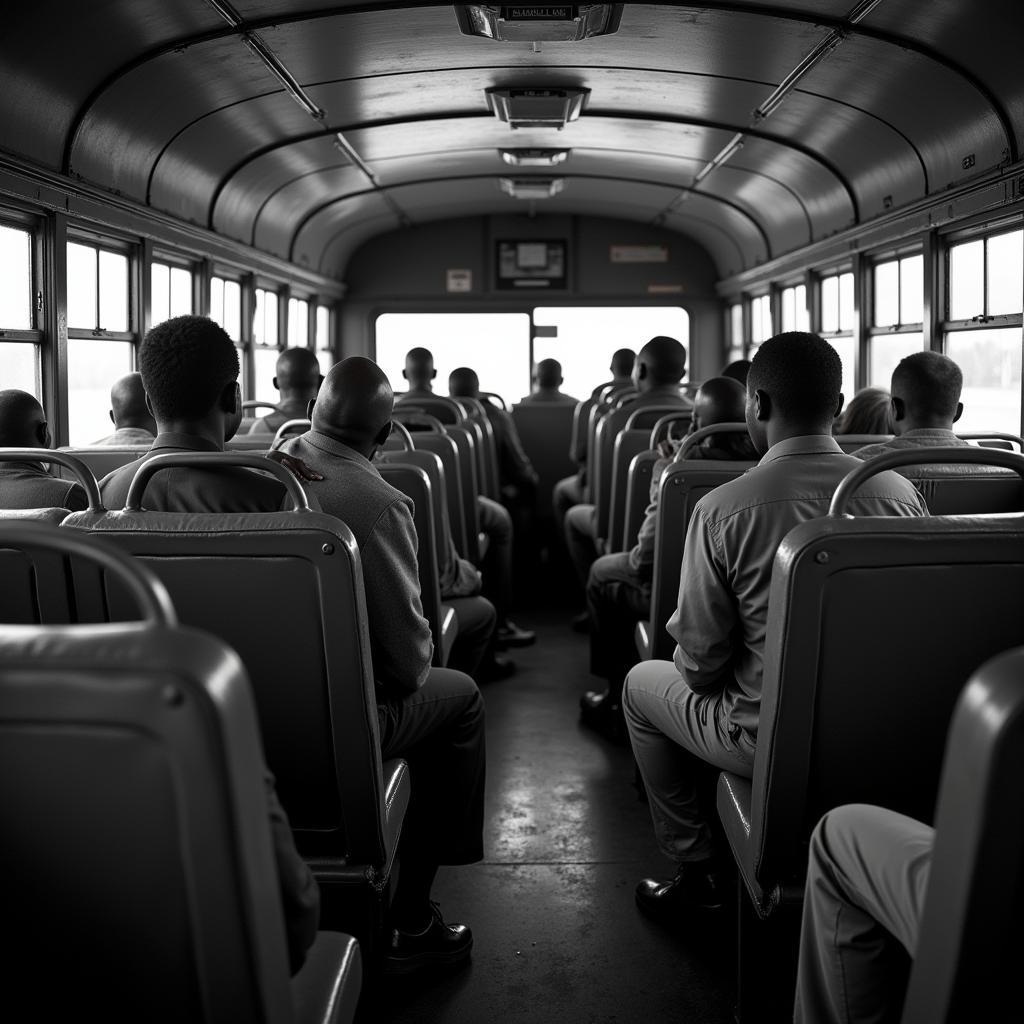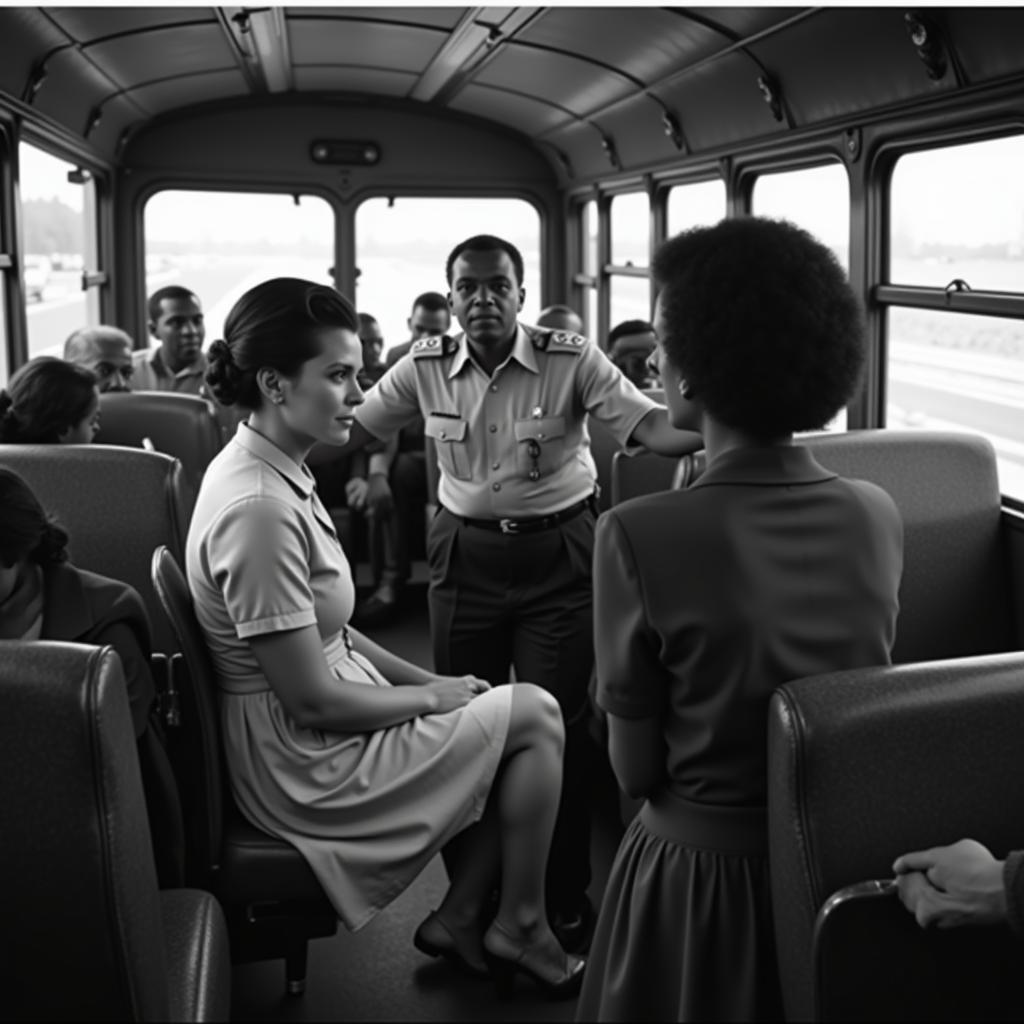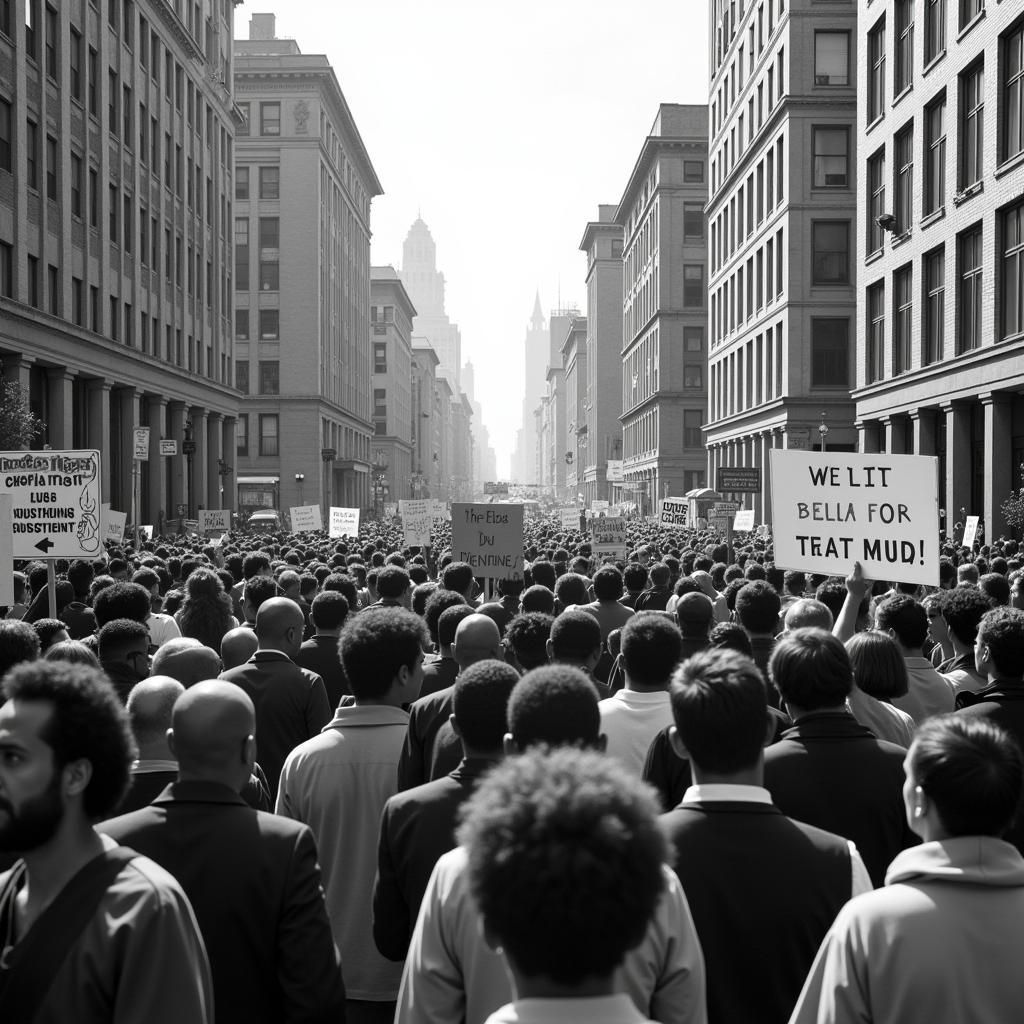Riding Through Change: The African American Bus Boycott
The African American Bus boycott, a pivotal moment in the Civil Rights Movement, wasn’t just about transportation; it was about dignity, equality, and the right to exist freely in public spaces. This struggle, often symbolized by the iconic image of Rosa Parks refusing to give up her seat, resonated far beyond the segregated streets of the American South, becoming a beacon of hope and resistance for oppressed communities worldwide.
The Seeds of Discontent: Segregation on Southern Buses
To truly understand the impact of the African American bus boycott, we must first delve into the oppressive reality of segregation in the Jim Crow South. Public transportation, particularly buses, became a stark symbol of this unequal system.
 African American Passengers on a Segregated Bus
African American Passengers on a Segregated Bus
Laws, known as “Jim Crow” laws, were specifically designed to separate people based on race. These laws permeated every aspect of Southern life, dictating where Black Americans could eat, drink, shop, and even be buried.
On buses, Black Americans were forced to sit in the back, often in cramped and uncomfortable conditions. They were frequently subjected to verbal abuse and physical intimidation from white passengers and drivers. Even paying the fare was a humiliating experience, as Black riders often had to enter through the front, pay, exit, and then re-enter through the back door.
The Spark that Ignited a Movement: Rosa Parks and the Montgomery Bus Boycott
The Montgomery Bus Boycott, a defining moment in the Civil Rights Movement, was ignited on December 1, 1955, when Rosa Parks, a seamstress and NAACP secretary, refused to give up her seat to a white man on a crowded bus in Montgomery, Alabama. This act of defiance, fueled by years of enduring segregation’s injustices, resonated throughout the Black community and beyond.
 Rosa Parks' Arrest
Rosa Parks' Arrest
News of Parks’ arrest spread like wildfire, galvanizing Montgomery’s Black community into action. Under the leadership of a young Baptist minister named Martin Luther King Jr., the Montgomery Improvement Association (MIA) was formed, calling for a boycott of the city’s buses.
The boycott, which lasted for 381 days, was a testament to the unwavering spirit and resilience of Montgomery’s Black community. Despite facing economic hardship, intimidation, and violence, they remained steadfast in their commitment to equality. The boycott proved to be a logistical triumph, with carpools, walking groups, and alternative transportation systems quickly organized to support the movement.
Beyond Montgomery: The Ripple Effects of Bus Boycotts
The Montgomery Bus Boycott, while a singular event, had far-reaching implications for the Civil Rights Movement. It demonstrated the power of nonviolent direct action in challenging segregation and served as a blueprint for future protests and demonstrations.
 Civil Rights March
Civil Rights March
The success in Montgomery inspired similar boycotts across the South, from Tallahassee, Florida, to Little Rock, Arkansas. Each boycott, while unique to its location and circumstances, contributed to the growing momentum of the Civil Rights Movement, chipping away at the foundations of segregation.
The boycotts also brought to light the interconnectedness of the struggle for racial equality. They demonstrated that the fight for civil rights was not just a Southern issue but a national one, capturing the attention of the media and the nation as a whole.
The Legacy of the African American Bus Boycott: Echoes of Resistance
The legacy of the African American bus boycott continues to resonate today, reminding us of the power of collective action in challenging injustice. It serves as a potent reminder that progress often comes at a cost, demanding courage, sacrifice, and unwavering determination.
The boycotts also highlight the importance of leadership and organization in social movements. Figures like Rosa Parks and Martin Luther King Jr. emerged as powerful symbols of hope and inspiration, demonstrating the transformative impact that individuals can have when they take a stand against injustice.
The struggle for equality and justice is an ongoing one. The African American bus boycott serves as a testament to the resilience of the human spirit in the face of adversity and a powerful reminder that change, while often slow and arduous, is always possible.
FAQs about the African American Bus Boycott
1. Why did Rosa Parks refuse to give up her seat?
While often portrayed as a simple act of defiance due to fatigue, Parks’ refusal was a calculated decision rooted in her lifelong activism against racial injustice. She had long been involved in the NAACP and was acutely aware of the ongoing struggle against segregation.
2. How long did the Montgomery Bus Boycott last?
The boycott lasted for 381 days, from December 5, 1955, to December 20, 1956.
3. What was the impact of the Montgomery Bus Boycott?
The boycott led to the desegregation of Montgomery’s buses and served as a catalyst for the Civil Rights Movement, inspiring similar protests across the South.
4. Was the boycott successful?
Yes, the boycott was considered a success. It not only led to the desegregation of Montgomery’s buses but also brought national attention to the issue of racial segregation in the South.
5. What can we learn from the African American bus boycott today?
The boycott reminds us of the power of collective action, the importance of standing up for what is right, and the enduring legacy of the Civil Rights Movement in the ongoing struggle for equality.
Need More Information?
This is just a glimpse into the rich history of the African American bus boycott. For further exploration, consider these related topics:
- African American business quotes: Discover inspiring words from Black entrepreneurs and leaders.
- African American business history: Delve into the history of Black businesses and their impact on American society.
- African American buisiness: Explore the landscape of contemporary Black-owned businesses and their contributions to the economy.
- African American business: Gain insights into the challenges and triumphs of Black entrepreneurship in today’s world.
- 20th century African American literature syllabus: Explore literary works that provide diverse perspectives on the African American experience, including the Civil Rights Movement.
Let’s Connect
Have more questions or need further assistance? We’re here to help! Contact us at +255768904061, kaka.mag@gmail.com, or visit us in Mbarali DC Mawindi, Kangaga, Tanzania. Our dedicated customer support team is available 24/7 to assist you.